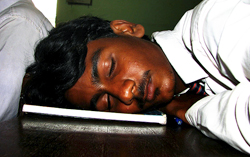NO.6, Jalan Abdullah, Off Jalan Bangsar,
59000 Kuala Lumpur, Malaysia
Tel: 03-2282 5241 Fax: 03-2282 5245
Website: www.humanrightspartymalaysia.com
Email:info@humanrightspartymalaysia.com
Your Reference :
In Reply :
Date : 28th June 2010
YAB. Dato Seri Najib Razak
Prime Minister of Malaysia
Block Utama Bangunan Perdana Putra,
Pusat Pentadbiran Kerajaan Persekutuan,
62502 Putrajaya. By fax no: 03-8888 3444 E-Mail: najib@pmo.gov.my
YAB Tan Sri Khalid Ibrahim,
Menteri Besar Selangor,
Pejabat Menteri Besar Selangor,
Tingkat 21,
Bangunan Sultan Salahuddin,
Abdul Aziz Shah, By fax No: 03-5519 0032
40503 Shah Alam, Selangor. E-Mail : khalid@selangor.gov.my
Re: Top polytechnic and STPM Indian students denied scholarships and university places. Only 0.33% Indian students allowed in 86,000 Polytechnic places. 0.02% finally make it to university.
This morning Uhmamaheswary Teruvengedam (No KP: 861025565142) and Kuganesh Kuppusamy (No KP: 880325086489) of Polytechnic Port Dickson walked into our office. Their friend Dineshwari Palayappan (No KP: 881130055548) could not make it as she has been hospitalized for suspected dengue fever. Top student Uhmamaheswary had scored 3.45 CGPA points in her diploma course at Polytechnic Port Dickson. Her mother is a single parent and has four other siblings to feed by working as an unskilled factory worker earning RM 800 per month. Her mother was herself denied skills training or higher education by UMNO during her student days. And now this UMNO segregation is hitting her daughter and intended to also hit all her future generation. Her mother cannot afford to send her overseas or to a private university.
The above is only the tip of the iceberg in higher education. In almost every expect of life, by the very same racist, religious extremist and supremacist policy UMNO discriminates and marginalises the Indian. PKR, DAP, PAS, NGOs simply watch silently this ‘blood letting’.
The weak among the Indians simply give up life and attempt suicide. The suicide rate among the Indians is 600% above the rate among the Malay community.
Compliments to the UMNO led One Malay-sian government with two education systems. Welcome to Malay-sia the world’s most racist and supremacist country in the world.
Malaysia remains the world’s last remaining apartheid regime, the last was South Africa which ended it’s apartheid system some 21 years ago in 1989.
Umhamaheswary could not control her tears when relating her family poverty and hardships and how hard her mother has to work to put them to school. There goes Umha’s ambition of graduating to become an accountant. What is wrong in dreaming to become an Accountant Mr. Prime Minister?
Umha’s coursemate Kuganesh a/l Kuppusamy scored 2.79 CGPA and was also rejected a place in all the 20 public universities in Malaysia. So was his other course mate Dineswary Palanyappan and thousands of deserving Diploma and STPM students. For any Malay Muslim student 2.00 CGPA points would be sufficient to qualify them into any university. But not for these sixth generation Malaysian born Indian students with even 3.45 CGPA. This is just the tip of the iceberg of top and high achieving Indian STPM and Diploma students being denied a place in local public Universities and given scholarships and PTPTN loans. (Copies of their rejection letters is enclosed herewith).
Kuganesh tells us that it is because of this (racist and supremacist UMNO) policies that Indian youths are going astray and getting involved in crime and gangsterism etc.
Kuganesh asks is it wrong to dream of becoming an Accountant.
Both Kuganesh and Umha tell us that out of the 15 Indian students at Polytechnic Port Dickson out of the total 4,500 students ( a mere 0.33%) only a mere one or 0.02% finally made it to the public university.
For the Malay Muslim and other native students the sky is the limit for them as up to 99% of the 86,000 places in the 27 public Polytechnic and an estimated 95% of the 847,000 places (NST 7/8/08, page 16) in the 20 public universities are for Malay muslims. This is on top of the 200,000 places in UITM which is exclusively for the Malay Muslims (UM 22/ 11/2009 at page 25).
Save an except for some poor Chinese students, the rest or an estimated 99% are exclusively for only Malay Muslims. The Malaysian Chinese who control 70% of the Malaysian economy may not need these Polytechnic and University places as many can afford to go to private universities locally and overseas. The poor Chinese have the cash rich Chinese Guilds and Associations to help them.
For the Malay muslims and the natives the sky is the limit in terms of education for them. The rich Indians (a mere 1%) also sent their children overseas or local private Universities. This segregates and excludes only the Indian poor from the nation higher education policy of One Malay-sia with two education policies.
So who speaks for these poor Indian students? PKR? DAP? PAS? Indian elite? NGOs? MIC? PKR, DAP and PAS Indian mandores? UMNO’s print and electronic media?
All odds are stacked up against these poor Indian students.
The writing on the wall is very very clear indeed for the Malaysian Indians – if you are the very top brains (top 1%) or your parents are rich, have their EPF savings or other savings or can sell their land or house, then UMNO wishes you all the best to study at local private universities or overseas.
But if you are form an average, low income earning, poor or hardcore poor Indian, you are doomed!
Many youths get drawn into the world of crime. They are rebelling against the system, against the discrimination and marginalisation. It is their way of getting back at Malaysian society. They end up using their ‘untapped intelligence’ in crime and 95% of the Malay-sians shot dead by the police are the Indians. 60% of the Malaysian occupants in prisons are Indians when they form only 8% of the population ie about 70%, disproportionately over represented in prisons.
We hereby urge your goodselves to wipe out the tears of these poor Indian students and grant them their due places in the public universities. We estimate 2,271 Indian top achievers have been denied places in matriculation, universities as well as JPA loans this year alone!
______________
P.Uthayakumar
Secretary General (pro tem)
59000 Kuala Lumpur, Malaysia
Tel: 03-2282 5241 Fax: 03-2282 5245
Website: www.humanrightspartymalaysia.com
Email:info@humanrightspartymalaysia.com
Your Reference :
In Reply :
Date : 28th June 2010
YAB. Dato Seri Najib Razak
Prime Minister of Malaysia
Block Utama Bangunan Perdana Putra,
Pusat Pentadbiran Kerajaan Persekutuan,
62502 Putrajaya. By fax no: 03-8888 3444 E-Mail: najib@pmo.gov.my
YAB Tan Sri Khalid Ibrahim,
Menteri Besar Selangor,
Pejabat Menteri Besar Selangor,
Tingkat 21,
Bangunan Sultan Salahuddin,
Abdul Aziz Shah, By fax No: 03-5519 0032
40503 Shah Alam, Selangor. E-Mail : khalid@selangor.gov.my
Re: Top polytechnic and STPM Indian students denied scholarships and university places. Only 0.33% Indian students allowed in 86,000 Polytechnic places. 0.02% finally make it to university.
This morning Uhmamaheswary Teruvengedam (No KP: 861025565142) and Kuganesh Kuppusamy (No KP: 880325086489) of Polytechnic Port Dickson walked into our office. Their friend Dineshwari Palayappan (No KP: 881130055548) could not make it as she has been hospitalized for suspected dengue fever. Top student Uhmamaheswary had scored 3.45 CGPA points in her diploma course at Polytechnic Port Dickson. Her mother is a single parent and has four other siblings to feed by working as an unskilled factory worker earning RM 800 per month. Her mother was herself denied skills training or higher education by UMNO during her student days. And now this UMNO segregation is hitting her daughter and intended to also hit all her future generation. Her mother cannot afford to send her overseas or to a private university.
The above is only the tip of the iceberg in higher education. In almost every expect of life, by the very same racist, religious extremist and supremacist policy UMNO discriminates and marginalises the Indian. PKR, DAP, PAS, NGOs simply watch silently this ‘blood letting’.
The weak among the Indians simply give up life and attempt suicide. The suicide rate among the Indians is 600% above the rate among the Malay community.
Compliments to the UMNO led One Malay-sian government with two education systems. Welcome to Malay-sia the world’s most racist and supremacist country in the world.
Malaysia remains the world’s last remaining apartheid regime, the last was South Africa which ended it’s apartheid system some 21 years ago in 1989.
Umhamaheswary could not control her tears when relating her family poverty and hardships and how hard her mother has to work to put them to school. There goes Umha’s ambition of graduating to become an accountant. What is wrong in dreaming to become an Accountant Mr. Prime Minister?
Umha’s coursemate Kuganesh a/l Kuppusamy scored 2.79 CGPA and was also rejected a place in all the 20 public universities in Malaysia. So was his other course mate Dineswary Palanyappan and thousands of deserving Diploma and STPM students. For any Malay Muslim student 2.00 CGPA points would be sufficient to qualify them into any university. But not for these sixth generation Malaysian born Indian students with even 3.45 CGPA. This is just the tip of the iceberg of top and high achieving Indian STPM and Diploma students being denied a place in local public Universities and given scholarships and PTPTN loans. (Copies of their rejection letters is enclosed herewith).
Kuganesh tells us that it is because of this (racist and supremacist UMNO) policies that Indian youths are going astray and getting involved in crime and gangsterism etc.
Kuganesh asks is it wrong to dream of becoming an Accountant.
Both Kuganesh and Umha tell us that out of the 15 Indian students at Polytechnic Port Dickson out of the total 4,500 students ( a mere 0.33%) only a mere one or 0.02% finally made it to the public university.
For the Malay Muslim and other native students the sky is the limit for them as up to 99% of the 86,000 places in the 27 public Polytechnic and an estimated 95% of the 847,000 places (NST 7/8/08, page 16) in the 20 public universities are for Malay muslims. This is on top of the 200,000 places in UITM which is exclusively for the Malay Muslims (UM 22/ 11/2009 at page 25).
Save an except for some poor Chinese students, the rest or an estimated 99% are exclusively for only Malay Muslims. The Malaysian Chinese who control 70% of the Malaysian economy may not need these Polytechnic and University places as many can afford to go to private universities locally and overseas. The poor Chinese have the cash rich Chinese Guilds and Associations to help them.
For the Malay muslims and the natives the sky is the limit in terms of education for them. The rich Indians (a mere 1%) also sent their children overseas or local private Universities. This segregates and excludes only the Indian poor from the nation higher education policy of One Malay-sia with two education policies.
So who speaks for these poor Indian students? PKR? DAP? PAS? Indian elite? NGOs? MIC? PKR, DAP and PAS Indian mandores? UMNO’s print and electronic media?
All odds are stacked up against these poor Indian students.
The writing on the wall is very very clear indeed for the Malaysian Indians – if you are the very top brains (top 1%) or your parents are rich, have their EPF savings or other savings or can sell their land or house, then UMNO wishes you all the best to study at local private universities or overseas.
But if you are form an average, low income earning, poor or hardcore poor Indian, you are doomed!
Many youths get drawn into the world of crime. They are rebelling against the system, against the discrimination and marginalisation. It is their way of getting back at Malaysian society. They end up using their ‘untapped intelligence’ in crime and 95% of the Malay-sians shot dead by the police are the Indians. 60% of the Malaysian occupants in prisons are Indians when they form only 8% of the population ie about 70%, disproportionately over represented in prisons.
We hereby urge your goodselves to wipe out the tears of these poor Indian students and grant them their due places in the public universities. We estimate 2,271 Indian top achievers have been denied places in matriculation, universities as well as JPA loans this year alone!
______________
P.Uthayakumar
Secretary General (pro tem)

 (The Malaysian Insider) He also told gaming industry analysts that Pakatan Rakyat (PR) was to blame for the Najib administration’s backtracking, and alleged that illegal bookmakers had spent between RM100 million and RM300 million to smear his attempt to introduce above-board football betting.
(The Malaysian Insider) He also told gaming industry analysts that Pakatan Rakyat (PR) was to blame for the Najib administration’s backtracking, and alleged that illegal bookmakers had spent between RM100 million and RM300 million to smear his attempt to introduce above-board football betting.




















